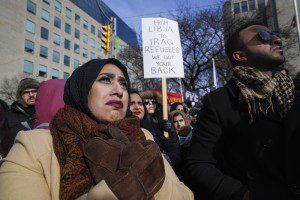The world as we know it is at a critical cross road. If one looks across the geometric and political divide whether be it in the West or East, the permanent features are theaters of conflict, bloodshed and brutality. These conflicts are often driven by bigoted, altruistic, tribal or nationalistic quests to cling on to power. On other occasions, there may often be a warped and distorted theological undertone or overtone inspiring and spurring a movement to gain control and power or retain control and power. With the recent election results in the U.S. where Donald Trump defying the political odds was elected as president; to the rise of populism in the continent of Europe that is swaying toward the right of the political spectrum — there seems to be an ultra-right, ultra-nationalistic and often xenophobic trend emerging that is at odds with the universal normative human values of mutual respect and dignity for fellow human beings and other nations.
The warped theological undertone is not restricted to what one can coin as predominantly a western phenomenon. It has also raised its ugly head in many parts of the Muslim World through the guise of radical nihilistic terrorist organizations such as “Al-Qaeda” and “ISIS.” The difference here is that that the warped undertone has been fueled and given ammunition to turn into a visible expressive overtone that subsequently causes death, destruction, pillage and carnage in the vicinities that it sets foot. It is under this rubric that I pontificate and ask geo-political and theological analysts to reflect on these warped and distorted theo-political undercurrents that are simmering in our world today across multiple national, racial and at times religious divides and consider that if such bigoted undercurrents start to become the political norm by turning into visible over-currents that the very fabric of our societies and nation states could be in danger and start heading towards a world of anarchy, unrest and disorder. When plural norms that the continents of Europe and the Americas have in the main enjoyed after periods of war and turmoil begin to be dismantled by disproportionate and discriminate treatment of the “other” be it on the ground of nationality, immigration, race or religion then what we have simmering is a hot melting pot that could implode with disastrous consequences for all.
Theo-political overtones are commonly used in our discourses by journalists and analysts alike today. Post 9/11, George Bush Jr. used the loaded phrase of “crusade against terrorism,” which was a visible verbal expression that can trace its roots to medieval military expeditions made by Europeans to recover the “Holy Land” from the Muslims in the 11th, 12 and 13th centuries. “Jihad,” “Jihadist,” “Islamist,” or “Islamism” are now commonly used words to describe individuals usually with a Muslim name who commit acts of criminality or travel to foreign lands to partake in war zones. However, these terms are distorted lexically accepted in contemporary discourse that have gained political traction but have no correlated linkage to the core classical meanings from the Islamic tradition itself. “Jihad” in the classical Islamic tradition means “to exert effort, to better oneself or to struggle for a noble cause. “Jihadist” or “Islamist” have no lexical linkage as a commonly used word within the Islamic tradition itself. There seems to be a language of acceptability in the mainstream media and political discourse to use the word “Islam” and acts of criminality in an intertwined and misrepresented manner which is not conducive in creating and enabling cohesive societies to exist and subsequently either directly or indirectly antagonizing the overwhelming law abiding peaceful Muslims in multiple parts of the world who feel that a gross misrepresentation of their faith is unfolding without any justification.
Whereas normative theo-political undertones or overtones that are generally accepted as the core tenets and principles within the theological frameworks of mainstream faith traditions would not advocate hatred and violence of the “other.” It is the “extreme theo-political” undertones and overtones which traverse towards the realms of individual and political violence, hatred, division, discriminate and indiscriminate extermination of individuals and groups that do not ascribe to their world view where the tensions and root of the problems reside.
Whether it is the distorted theological undertones by the evangelical movements in the U.S. which emanate into political overtones via neo-conservative or far right republican groups and parties, whether it is the distorted ultra- national political overtones of parties such as UKIP in the UK, racial overtones by the English Defence League (EDL), far right parties such as Geert Wilders Party for Freedom in Holland; Jean -Marie Le Pen’s National Front in France; whether it is the distorted theological undertones that germinate in parties such as the BJP in India which lead to an overtone advocating hatred and violence towards the “other”; whether it is the distorted theological undertones that find ammunition via visible non state actors and groups such as “Al-Qaeda” or “Daeash” (ISIS), or whether it is the distorted theological undertone that has tuned into a visible theo-political overtone in Burma with the mass genocide and human rights violations against Rohingya what is required as a solution to these distorted theological undertones, overtones along with the distorted political undertones and overtones is a re-alignment toward the centre ground in theological and political policy making. It is only by working to curtail the tide of these extreme currents by proactively advocating the message of the centre ground in our faith and political institutions and via the mouth-pieces of our faith and political leaders that the violent tide of extremism can be challenged. A process of normalization is called for by instilling a sense of belonging, citizenship in the respective countries based on principles of justice, equality and the rule of law via a balance stabilizer which projects us towards a state of equilibrium in our societies can the menace and distorted theological and political currents of extremism, hatred, violence and terrorism be curtailed.
Kaleem Hussain has an academic and practical background in Law, Economics & Government Studies, UK- and is active in working on inter-faith, counter extremism, peace and reconciliation initiatives to bring communities together at a local, national and international level.














